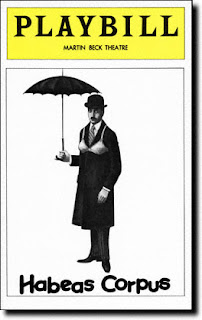 |
| My dislike for puppets began here, with the marionette boy who was turned into a donkey. Frightening. |
The most famous of the puppets of the modern era must surely be the Muppets. While I can appreciate the creativity which went into the creation of the Muppet World, I have never been able to feel the slavish attraction to these figments that just about everybody else feels. I'm sure it's my loss, but there it is. Still, my unease around these creatures notwithstanding, the Muppets have appeared on the Dance Party several times.
 |
| These are the only Muppets I can stand. |
I willingly concede that the syndicated program which brought them to the attention of the adult world, a satire of the standard variety show called, appropriately, The Muppet Show, was creatively produced. That program furnished this Dance Party starring Juliet Prowse, and this one starring Lynn Redgrave. Considering my antipathy toward these annoying creatures, it's surprising that this week's Dance Party, once again, features the Muppets. They return to the Dance Party because of this guy:
This is Dan Cathy, the current CEO of the fast food giant Chik Fil-A. His father created the company, and now, Dan runs the organization. He's been in the news this week, as I'm sure you know, because he has publicly confirmed his company's attitude toward marriage equality.
 |
| Cathy with his father, the founder of the company. Still family-held, they are unlikely to change their stance until a board of directors forces the issue, as happened with Coors years ago. |
This is old news to many of us; it's been known for years that Chik Fil-A contributes buttloads of money to anti-gay causes. But CEO Dan, bless him, significantly raised the profile of his company's prejudice this week, and now, everybody knows exactly where his company's profits are going.
The vast majority of the Chik Fil-A franchises are in the South; as such, I have often lived in close proximity to one or more of them. I have never given them my business. If I want fast food chicken, it's KFC for me. I was never even tempted to go into a Chik Fil-A.
 |
| Standard ad for the company. |
 |
| Another ad celebrating their customers' illiteracy. |
I'll pass on any corporation who, from their name to their advertising, ridicules the fact that, for decades, many southerners could not read nor write.
But back to those warhorses, The Muppets. The Jim Henson Co. has publicly disassociated itself with Chik, while the franchise has yanked Muppet merchandise from their kids' meals, due to "safety issues."
The Henson Co has announced that all the proceeds they have received due to their unfortunate relationship with the bigoted company will be donated to GLAAD.
The mayors of both Boston and Chicago have issued statements that Chiks are not welcome there; in retaliation, Mike Huckabee and other right wing pols are staging a Support Chik Fil-A day next week.
 |
| Paul Williams wrote "Rainbow Connection," and sang it a number of times, including in an episode of Picket Fences. |
I feel perfectly comfortable with the position Dan Cathy has placed his company in, though it's said that any kind of boycott will likely harm them only slightly. They already cater to citizens who agree with their principles regarding marriage, and boycotts don't tend to be as effective as the threats of boycotts do (I wrote about that a long while ago, and if you care to, check out that entry's comments as well, as a lively debate sprang up about "economic bullying"). Anyhoo, my admiration for the stance Jim Henson's caretakers have taken outweighs my distaste for his most famous creations, and I have a lot of respect for the Muppets these days. So do others, of course, including the guy who edited this week's Dance Party, who also supplied the vocals. Appropriately, the number in this clip is one of the most famous of the Muppet songs, and its message is pretty apropos.

























































































,+Olney+Theatre+Center,+2004.jpg)



,+Shakespeare+Theatre+Company,.jpg)


,+Warehouse+Theatre,+1999.jpg)
,+Are.jpg)
,+Everyman+Theatre,2002.jpg)
,+First+Nationa.jpg)
,+Shakespeare+Theatre+Company,.jpg)






,+Granada+Th.jpg)
,+Globe+Playhouse,.jpg)
,+CSUN,+1976.jpg)


